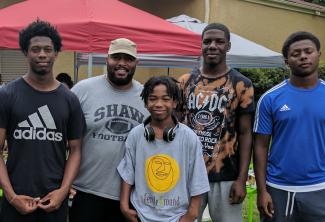
For many Black Americans, “cooperative economics” is nothing new. Before chattel slavery, many communities in Africa tilled land “in common” and shared harvests. During slavery, sharing food, resources, and money was one of the primary ways they ensured their survival.
“If they were farming, they shared the produce,” explains Jessica Gordon Nembhard, an economics professor. “They would save money to help each other buy their freedom.”
“Mutual aid societies” in the 1700s helped community members to take care of needs like paying for burial costs, and post-slavery, cooperation was also key to survival and success. “From Frederick Douglass to the Black Panther Party, the human rights movement is filled with examples of economic self-help,” says LaDonna Sanders-Redmond, a development consultant.
Cooperative Economics has been an integral pillar of Kwanzaa since the 1960s, and while the popularity of co-ops has grown and shrunk over the years, for many they represent both a connection to tradition and a vision for a more just economic future. Currently, Black Americans reportedly have $1.2 trillion in buying power, but only spend about 3% of their money within their own communities.
“The co-op model is so attractive because it’s sustainable by the community,” says Angela Dawson, who works with a co-op network in Minneapolis. “Everyone owns it,” she continues, “and it’s perpetual. It doesn’t depend on just one person and recycles back into the community.”
Co-ops like Fertile Ground, based in North Carolina, are leading movements in Black communities to make healthy food more accessible, create and sustain living-wage jobs, and build community through a co-op model.
Fertile Ground was founded after grocery store closures forced Southeast Raleigh into "food apartheid.” After years of visioning and fundraising, they launched an 8-week summer farmer’s market, started conducting classes and workshops, and have grown to over 400 owner-members. They recently raised enough money to conduct a market study that showed a path for feasibility for Fertile Ground to become a Black-led, co-op grocery store in a historically Black community neglected by conventional grocery markets.
Fertile Ground is currently in the midst of an “ownership drive” that will help sustain the movement. Owners support the co-op, but also get power in the organization’s decision making, as well as financial benefits like owner specials and discounts on food, classes, and workshops.
When racism outright denied Black people access to work, food, and other amenities, communities established co-ops for food, banking, and even health insurance. Survival, collective economics and responsibility, as well as political and economic empowerment all come together in co-ops, and Fertile Ground is an incredible example of moving this legacy forward.
If you’d like to become a member-owner, check out their website and see how! You could be an essential part of the movement for Black liberation!